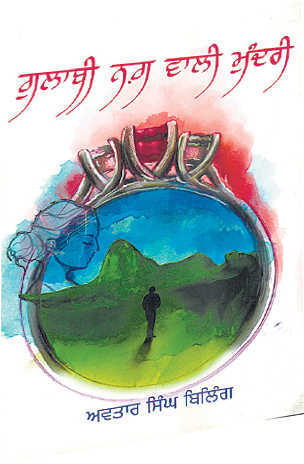
Gulabi Nag Wali Mundri by Avtar Singh Billing. Avis. Pages197. Rs 350
Jaspal Singh
Punjabi novelist Avtar Singh Billing is a notable name in Punjabi fiction. He has done seven novels, six collections of short stories and three books on children literature. In the past few years he has been decorated with Shiromani Sahitkar Award by the Punjab Government and the first Dhahan prize in 2014. Gulabi Nag Wali Mundri is his latest novel.
Like his other fictional works, this novel is also located in the Dhaha region of Punjab, an area around Khamano, Amloh, Khanna and Samrala. Many famous novelists like Thomas Hardy and Arnold Bennett also had their favourite locales like Wessex and Potteries, respectively. Following in their footsteps, Billing has given a short glossary of colloquial words of Dhaha and their meanings at the end of the novel.
The intensity of caste prejudices in Punjab is the main theme. Most of India is severely afflicted with this malady though Punjab, because of the influence of Sikhism, is less impacted. There is no untouchability in Punjab but inter-caste kinship relations are negligible. Despite claims, a large majority of Sikhs do believe in caste boundaries, especially while making matrimonial alliances. Occasionally inter-caste marriages do take place but these are few and far between. Marriages between the Dalits and the upper castes are negligible. In Gulabi Nag Wali Mundri, Ladi (Manpreet), a Jatt from a lower middle class farming family whose both parents are government servants, falls in love with a good-looking Dalit classmate Rano (Rupinder).
Ladi tells his parents his desire to marry Rano. But they vehemently oppose the proposal. His mother screams, "You have fallen in love at first sight. You have not enquired about her family background. How will you deal with them when you visit to your in-laws? Won't you feel any nauseating revulsion from those stinking paupers? Will you develop kinship relations with these low-born menials? That wretch won't be able to discard those repulsive creatures and you won't be accepted by their kinship circle".
But Ladi is adamant and threatens to commit suicide if he is not allowed to marry his love. He strongly castigates the caste system and the backward thinking of his parents. A huge war of words is unleashed in the family. All other relations are also sucked into it. Caste attitude and sensibilities of middle class Punjabis are ruthlessly exposed. The family conflict is almost as bitter as in rest of India though not as violent as in the states ruled by the khap panchayats.
The stressful atmosphere sends both the mother and the father into depression and they are compelled to take psychiatric counselling and medication. Their elder daughter Baby, who is studying nursing at Patiala, too, falls in love with a boy from a different caste. So it is a double whammy for the parents. Their youngest son, Rinku, wants to migrate to Canada. But the parents do not approve of it and in desperation he commits suicide. So, the once a happy family is completely wrecked because of its own orthodoxy.
During this family turmoil, Ladi shifts to Chandigarh for higher studies and later becomes a school teacher. Rano, too, takes recourse in her studies. In the face of the fierce family opposition Ladi turns into an indifferent, callous, almost a stoic person. He decides not to marry in life and snaps all ties with Rano, who has become a college lecturer after finishing studies.
Ladi's cousin Sukhpreet is Rano's student and is helping her in her research project on the folk-songs of Punjab. Rano eventually marries Sukhpreet and they migrate to Australia. Ultimately, Rano marries into the same family breaking all caste barriers. Ladi's parents now feel guilty and are full of remorse.
The novel is significant because of its caste configurations and conflicts in the present-day Punjab which many Sikh preachers try to gloss over. Even gurdwaras in some villages are caste-centric and this malady has been exported to the Punjabi population in Western countries as well. Today, even the national politics is haunted by the spectre of caste epidemic. Billing has laid bare its socio-cultural ramifications through this poignant family drama which many Indian writers may avoid because of their caste prejudices.



























